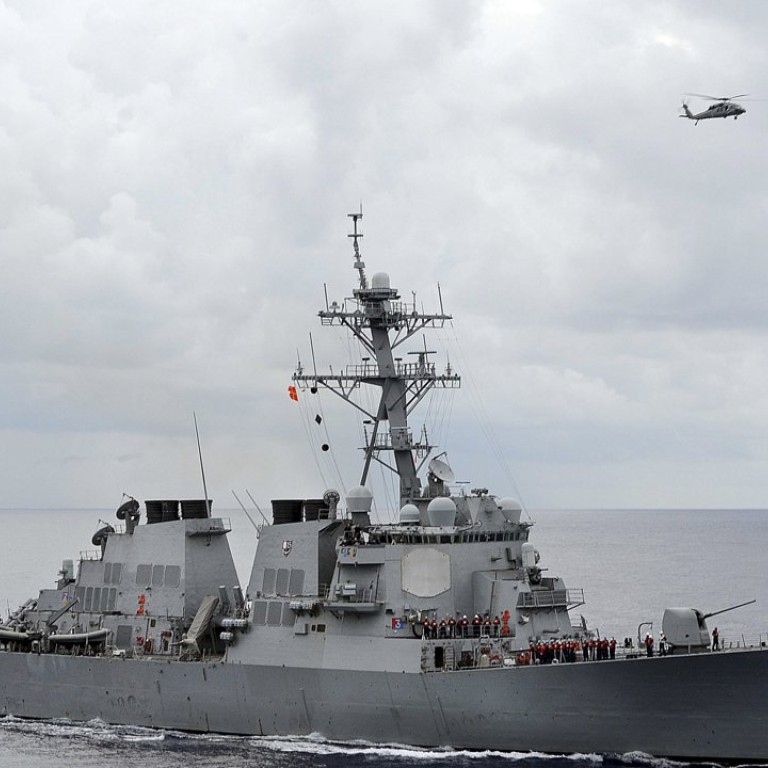
New | China urged to get tough with the United States over USS Curtis Wilbur’s sail-by near Triton Island in disputed South China Sea
Observers believe Beijing does not want heightened confrontation with Washington, but the latest affront may prompt it to speed up military test flights and building of facilities over the disputed waters
The sailing of an American naval vessel within 12 nautical miles of Triton Island in the disputed South China Sea last week has triggered calls among China’s military personnel for tougher action against the United States.
Beijing has condemned the Saturday incident involving guided-missile destroyer USS Curtis Wilbur, saying that it strongly opposed Washington’s “provocative move”, but there are those in China who believe the rebuke is not enough to deter the US from further such action.
Other observers say Beijing does not want a heightened confrontation with Washington, although the latest affront may prompt Beijing to speed up its test flights of military aircraft and construction of facilities over the disputed waters.
READ MORE: PLA garrison ‘warns off’ US Navy destroyer sailing close to island in disputed area of South China Sea
The defence ministry said the People’s Liberation Army garrison on Triton Island – which is part of the Paracel Islands – had taken action to warn off and repel the USS Curtis Wilbur, although no details were given.
But retired colonel Yue Gang said simply warning the American warship was insufficient.
“With radars and satellites, the Chinese military is capable of detecting the movement of US ships and aircraft, and is able to deter them much earlier,” Yue said. “US ships have entered into 12 nautical miles of the Spratly Islands, and now they have sailed into the Paracel Islands. The US is stepping up its provocation and challenging China’s ability to defend its territory.”

A passive response from Beijing would give the impression that the nation was weak in defending its territorial integrity, the former colonel added.
Pentagon spokesman Jeff Davis said Saturday’s move was aimed at challenging attempts to restrict freedom of navigation in the region and that none of the claimants of the area were informed beforehand.
The US claims to be a bystander, but judging from its recent warship and aircraft activities, it is a bystander too eager to become involved
State-run Xinhua yesterday published commentaries, accusing the US of being “ironic”.
“By repeatedly sending military ships on so-called “freedom of navigation” missions in the area, the US is actually abusing freedom of navigation and pursuing selfish gains at the cost of others,” read one commentary.
Another commentary said the US was “accustomed to hegemony and power politics” and China was a “victim” in the dispute.
“The US claims to be a bystander, but judging from its recent warship and aircraft activities, it is a bystander too eager to become involved,” it said.
Xu Guangyu, a retired major general and senior researcher at the China Arms Control and Disarmament Association, said Beijing had prepared different responses to Washington, with the possibility of speeding up construction in the South China Sea and conducting military test flights at the new airports there.
READ MORE: China’s neighbours wary of taking sides in Sino-US South China Sea dispute
Civil aircraft had already completed test flights on the Spratly Islands – suggesting that the facilities there were ready for military aircraft use as well, Xu said.
But he said Beijing would be cautious to avoid being seen as provoking confrontation.
“China still wants to be seen in the international community as being reasonable; it is not in its interests to have confrontations with the US,” Xu said.
Zhang Baohui, a China security specialist at Hong Kong’s Lingnan University, said Beijing might send more military vessels and aircraft to the disputed region to convey the message that its activities in the South China Sea would continue despite US pressure.
But it would take steps to avoid being accused of “militarising” the islands, Zhang said.
“The strategic cost for having a major confrontation with the US will be too heavy for Beijing.”

